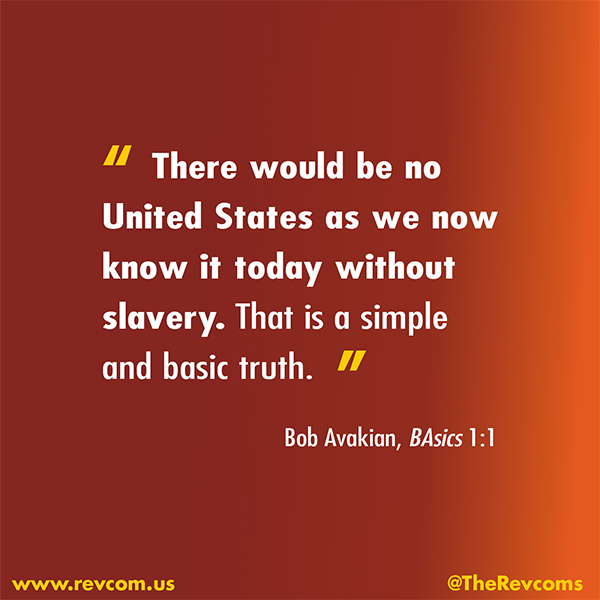1619:
The Struggle for Historical Truth...and the Fight for the Future
a letter from Andy Zee
| revcom.us
Dear Revcom.us:
First, I appreciate revcom.us opening up a series responding to the 1619 series in the New York Times and similar efforts in other publications such as The Guardian and in academia. This has tremendous import and relevance. I especially appreciate framing this as concentrating 3 futures:
- The Trump/Pence fascist assertion and brutal enforcement of white supremacy—the straight line from slavery through the civil war to MAGA today;
- The dominant line in the New York Times and other exposés of the true history of slavery for the purpose of showing that the struggle for the true history and to redress oppression engendered by this horrific past is the realization of the founding ideals of America;
- And the third future, the struggle to overthrow this system and move humanity past all forms of exploitation and oppression as envisioned in the Constitution for the New Socialist Republic in North America, authored by Bob Avakian.
It is of real import for all those who desire a world where white supremacy is uprooted to reflect on and seriously grapple with the content of the New York Times 1619 series and the ongoing controversies and debates that it provokes.
Already, there are sharp differences expressed between advocates of the first two futures. Here I want to draw to the attention of revcom readers that this controversy concentrates a core contradiction that is objectively posed by those who advocate the second of the two futures—that revealing the actual history of slavery and its effects on society down to today shows the perfectibility of America—has the potential to unravel America as we have known it. The following two commentaries reflect how representatives of these two futures view this.
First, is the comment of a Christian fascist blogger, radio host, and frequent TV commentator, with a large following, Erick Erickson. He wrote:
Americans, particularly white Americans, need to learn more about slavery in the United States. But doing so on the premise that the United States itself is flawed and illegitimate is not the way to do it. Sadly, that’s what so much of the Times’ coverage amounts to.
If the nation is founded on slavery and slavery is woven into the very fabric of our society, then our society is illegitimate. The only way to overcome it is to overturn it. That would take revolution. This is the path the New York Times goes down. Once it lights this fire, it will not be able to control it. But it wants to strike the match anyway.
A few days later on August 24, New York Times columnist Bret Stephens, in a piece on the main editorial page titled America the Beautiful, wrote:
[E]very significant liberation movement in the U.S., from abolition to suffrage to civil rights to marriage equality, has made its case by appealing to foundational principles, not rejecting them.
He then goes on to cite (accurately) that Frederick Douglass’s and Martin Luther King’s criticisms of slavery and the oppression of black people were accompanied with appeals for America to apply its founding principles. He then writes:
This has always been one of the astonishments of America: The origin story of the ruling class does more to undermine than bolster its claims to power....
[I]f a new origin story were to tell us that our ideals have always been a sham (as opposed to being honored too much in the breach), and that the whole story of America is one of unremitting oppression (as opposed to the far-too-gradual relief of oppression), then we would lose the mechanism of self-reproach by which past progress was made.
And, he concludes his ode to America the Beautiful after referring to one of the natural wonders of the Southwest with this:
[T]the real beauty of America has less to do with the outer vistas than the inner ones—the ever-renewing possibility of being “more perfect” according to ideals that remain our starting point and destination.
So I am writing to encourage readers of revcom.us to wrestle with and talk about this sharp difference between these first two futures and then between both of these futures and the emancipatory future of revolution on the foundation of the new communism.
It is significant that a lot of suppressed history is being exposed, including in the first special New York Times August 18 Sunday Magazine. But, to what end? Where do these articles lead? I was glad to see that revcom.us is publishing important work from Bob Avakian as a guidepost for readers of the Times series and what is sure to be a lot of engagement with this issue and this 400-year anniversary on campuses this fall. Engaging this issue, in the context of the three futures is not only a struggle for the true history, but as such has profound implications for the struggle for the future.
Wrapping up this correspondence I want to offer two points of reference and departure:
[1] The profound significance and relevance of the first quote from BAsics from the talks and writings of Bob Avakian:
There would be no United States as we now know it today without slavery. That is a simple and basic truth.
—Communism and Jeffersonian Democracy, 2008
[2] I encourage readers to read Communism and Jeffersonian Democracy (excerpted last week and available in full at revcom.us) as a foundation to understand from a scientific perspective why only the third future that has been qualitatively developed by Bob Avakian represents the road to the liberation of Black people from the legacy of slavery through a revolution to emancipate humanity.
Andy Zee
1619-2019: Introducing A New Series:
The Oppression of Black People and the Revolutionary Struggle to Emancipate Humanity
CONSTITUTION For The New Socialist Republic In North America
(Draft Proposal)
Authored by Bob Avakian, and adopted by the Central Committee of the RCP

Get a free email subscription to revcom.us:


